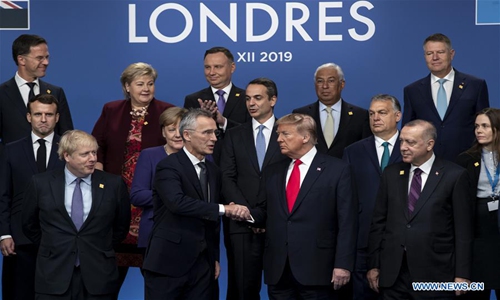HOME >> OPINION
NATO should change approach to China, Russia
By Andrea Fais Source:Global Times Published: 2019/12/11 21:03:40

NATO leaders are seen after a group photo at NATO Summit in London, Britain on December 4, 2019. Photo: Xinhua
On April 4, 1949, 12 Western countries founded NATO to create a defence structure capable of containing the military might of the Soviet Union. The Warsaw Pact took shape just six years later revitalizing then Soviet leader Joseph Stalin's idea to build a buffer space beyond the huge Sarmatic Plain to impede any other possible attempt of invasion after the WWII. Seventy years later, the Soviet Union does not exist anymore but NATO is still here and counts 29 member countries, waiting for another one - North Macedonia - that is completing its accession process.In the recent London summit, NATO Secretary General Jens Stoltenberg said, "This is the fifth year of rising defence investment" since "European allies and Canada have added $130 billion." According to the forecasts, "by the end of 2024, that figure will rise to $400 billion." "This is unprecedented," Stoltenberg added, "and it's making NATO stronger," noting "our meeting has once again demonstrated that NATO remains the only place where Europe and North America discuss, decide and act every day together. On strategic issues that concern our shared security."
Other important issues the London summit faced are "to enhance the protection of our energy infrastructure, how to ensure our technological edge in the face of emerging and disruptive technologies and to step up our response to hybrid threats" but because of skirmishes among NATO leaders, something did not work. Western countries seem to be divided like never before. Until now the London final joint declaration is composed of just nine points against the 139 points in the Warsaw declaration in 2016 or the 79 points in the Brussels declaration in 2018. This confirms a fissure in the transatlantic relationship.
During his speech on defence in 2017, French President Emmanuel Macron argued, "in the area of defence, our aim needs to be ensuring Europe's autonomous operating capabilities, in complement to NATO." Last year, German Chancellor Angela Merkel said that "it is no longer such that the United States simply protects us, but Europe must take its destiny in its own hands, that's the task of the future." Many observers believe EU-US tensions have emerged because of Trump's "America First" policy, but I think it has clearly deeper roots.
The alliance expansion had already created a lot of problems, starting in Central and Eastern Europe from the mid-1990s to the mid-2000s. Meanwhile, a long commitment in counter-terrorism activities had begun in South and West Asia following US military operations in Afghanistan and Iraq with The International Security Assistance Force in 2001 and The NATO Training Mission-Iraq in 2004, trying to support the newly-formed local governments against Islamist terrorism and extremism. Nevertheless, after the Libyan and Syrian wars - triggered by Arab Spring uprisings, the image of US and NATO started to change even in the West.
For at least three years, US, Canada and their main European allies, especially France, have supported extremist sectarian Sunni rebel troops: directly in Libya and their proxies in Syria. Salafists and Wahhabis were among them on the same front against Gaddafi and Assad and Western support to these rebels helped them like the old US-built FIM-92 Stinger missiles and bunkers helped Taliban militants against NATO twenty years after the Soviet-Afghan war.
This schizophrenic geopolitics has shown the limits of a doctrine that more and more clearly seems to put the containment of Russia, China and Iran before the security of Western citizens. Many doubts and questions have been raised in the past.
Was the specious war in Iraq a trial to bring pressure on Iran and Syria? Has the rhetoric on human rights in Bosnia, Chechnya and Kosovo been exploited to consolidate a new "green connection" among extremist sectarian Sunni militant groups in the Eurasian subcontinent? Is something similar happening in the Chinese autonomous region of Xinjiang, where Beijing has been unfairly blamed for repressing and discriminating against local Muslim communities?
Since 2015, terror attacks in Europe have shown that security is not a joke and some Western liberal lobbies or think-tanks need to understand that what they are doing is wishful thinking. The double standards on terrorism and the hypocrisy over a utopian borderless society must end. If NATO will really "continue to change as the world changes," as Stoltenberg argues, Western leaders should completely change their approach toward Russia and China, starting to consolidate defence cooperation with them and their allies in the Shanghai Cooperation Organization.
The author is a journalist and foreign affairs analyst based in Perugia, Italy. opinion@globaltimes.com.cn
Posted in: VIEWPOINT